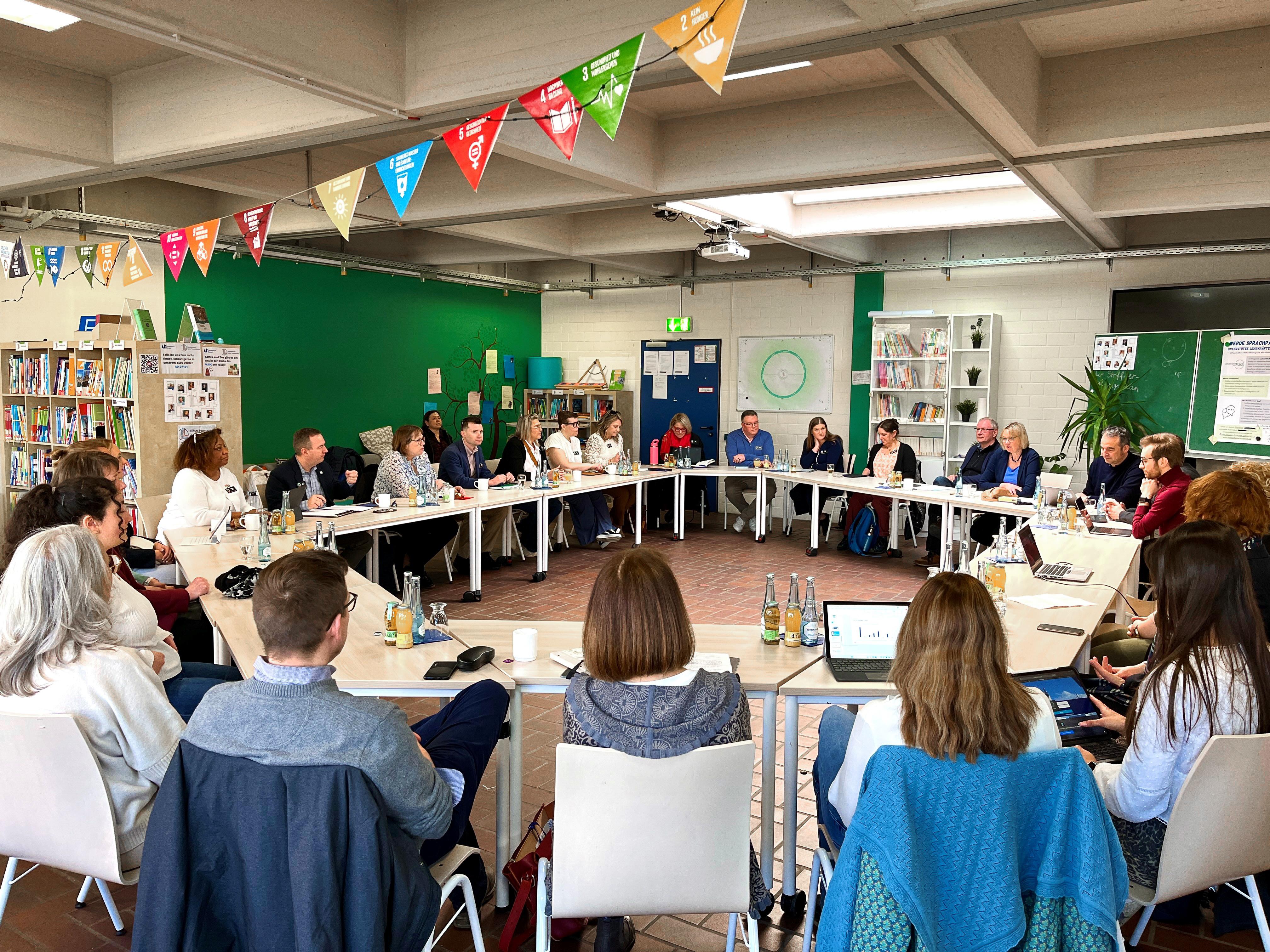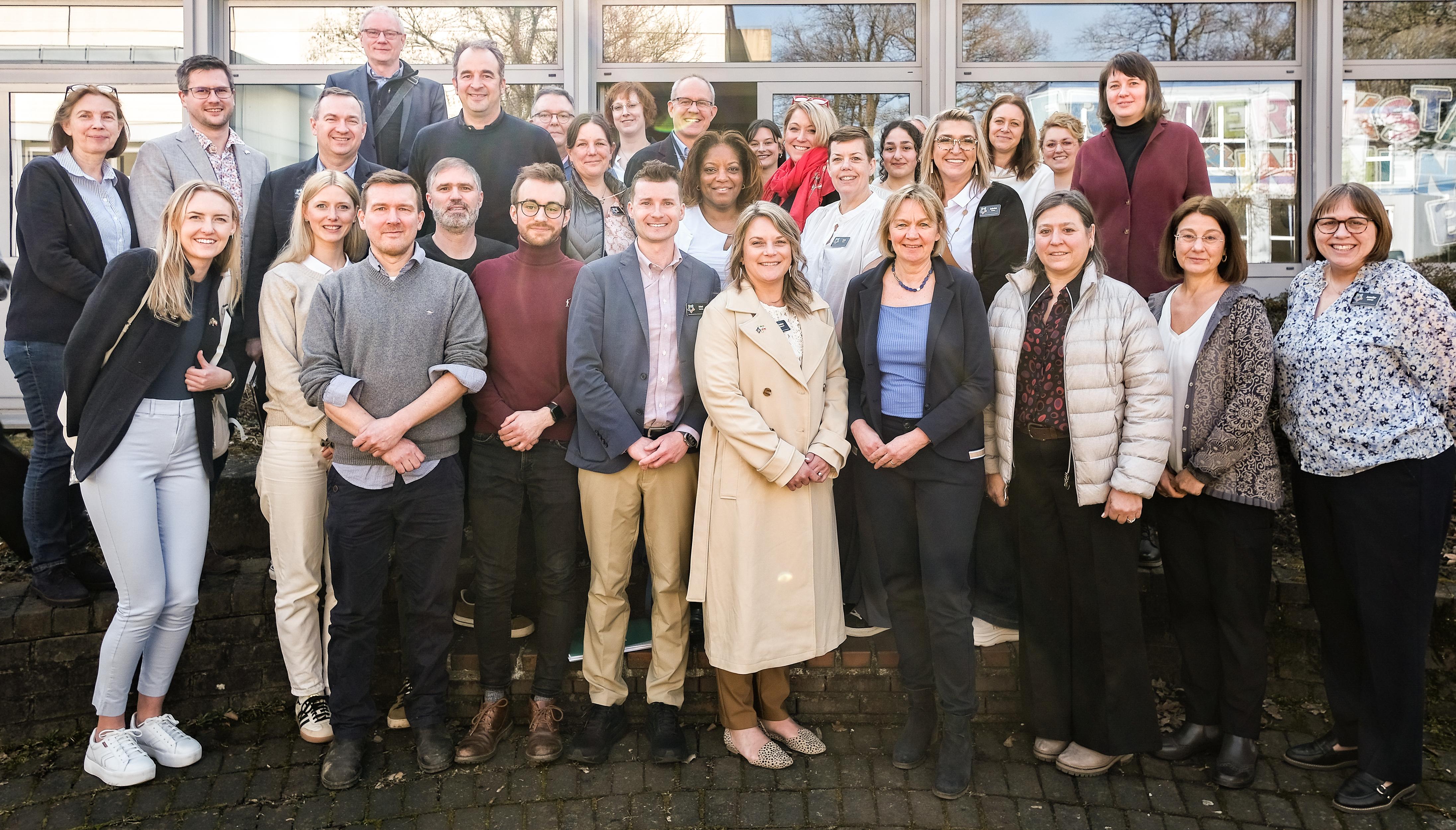Education Abroad: LESSONS FROM
GERMANY

1 FRONT COVER
INSIGHTS FROM PENNSYLVANIA’S INTERNATIONAL STUDY GROUP


INSIGHTS FROM PENNSYLVANIA’S INTERNATIONAL STUDY GROUP
Bold leadership and innovative thinking are essential to shaping the future of public education. This spring, a delegation of Pennsylvania school leaders, educators and policymakers traveled to North Rhine-Westphalia, Germany, as part of the second annual PSBA Institute International Education Study Group. The purpose of this study group was to explore one of the world’s most respected education systems and bring back insights that can inform and inspire change here at home.
Over the course of a week, our delegation engaged in deep, meaningful conversations with German educators, government o cials and business leaders. They toured schools and companies, observed classrooms and apprenticeship programs, and gained firsthand knowledge of Germany’s Dual Vocational Education and Training (VET) model – a system that seamlessly integrates academic instruction with real-world, hands-on experience. The result is a workforce-ready generation of students who are prepared not only for jobs, but for lifelong learning and civic engagement.
Perhaps most importantly, this trip rea rmed the power of collaboration – across borders, across sectors and across political lines. As our bipartisan legislative participants noted, the challenges we face in education are not unique, and the solutions we seek can be enriched through global dialogue.
We hope this report sparks new conversations and bold ideas among Pennsylvania’s education leaders. By learning from others and adapting what works, we can continue to build a public education system that meets the needs of every student, in every community.

Nathan G. Mains Chief Executive O cer, PSBA Managing Director, PSBA Institute
This publication captures the highlights and reflections of our study group participants. Their observations underscore the importance of early career exploration, strong industry partnerships and a cultural respect for vocational education – elements that are increasingly vital in today’s rapidly evolving economy.

Study trip recap
The study group focused on the educational system in North Rhine Westphalia, Western Germany. Before traveling to Germany, participants joined several Teams calls with education, business and government leaders to hear about their systems, academic approaches and policies.
Participants spent a week touring schools and conducting meetings with education and civic leaders in Düsseldorf and other communities in Western Germany. The meetings and visits provided an overview of the German education system, including how it works, how the system achieves results, how it is funded and more, to gather ideas for adaptation and implementation in Pennsylvania school districts.
The study group visited German schools at the primary and secondary levels to understand the structure of the education system and to meet with school administrators, educators and students. They also met with German government o cials, education agencies (federal and state ministries of education, city education departments) as well as other stakeholders, such as employer associations and unions that are involved in the German vocational education/apprenticeship system. Additionally, the group toured companies/manufacturers to see on-the-job training and to gain an understanding of employers’ perspectives on the German education system. Each day consisted of three to four meetings with institutions, some of which included working sessions over lunch or dinner. Cultural programming was also included.
Upon their return, participants developed a report with recommendations for Pennsylvania school districts to significantly enhance district academics, operations, facilities and culture. The following are brief summaries of the three main sections of the report. Read on for more content and click on the QR codes to access the full report online.
1
This four-part section provides a comprehensive overview of the German education system, with a focus on North Rhine-Westphalia (NRW). Outlined is Germany’s decentralized education structure, where each of the 16 federal states governs its own policies, and the early tracking of students into di erent secondary school types. The group notes that NRW stands out for its inclusive and integrative approaches, particularly in accommodating immigrant and refugee students through language support, heritage language programs and Municipal Integration Centers. The document also details the dual responsibility of state and municipal governments in funding and managing schools, the rigorous teacher training process, and the strong role of parents and communities in school governance. Despite its strengths, NRW faces challenges such as teacher shortages, resource disparities and increasing demands for early childhood education. The report emphasizes the importance of equity, multilingualism and community engagement in shaping a responsive and inclusive education system.
PSBA Institute’s study group also explored Germany’s Dual Vocational Education and Training system, a model that blends classroom instruction with hands-on industry experience. The resulting report o ers a firsthand look at how German schools and employers collaborate to prepare students for high-demand careers. Delegates visited vocational schools and companies such as Mercedes-Benz, where students train on-site while earning a salary. The group identified key takeaways for Pennsylvania’s career and technical education programs, including the value of early career exploration, stronger industry partnerships and integrated funding models. While Pennsylvania’s career and technology centers share similar goals, the German model’s deep employer integration and cultural respect for vocational training o er a compelling blueprint for enhancing workforce readiness across the commonwealth.
3
2025 International Education Study Group: Legislators’ Perspective
Rep. Valerie Gaydos, R-Allegheny (part), and Rep. Pete Schweyer, D-Lehigh, united in a bipartisan e ort to explore international education practices by accompanying the study group to Germany this past spring. They were particularly impressed by the apprenticeship model at companies like Mercedes-Benz and the proactive approach to teaching digital tools. In this reflection, they acknowledge the challenges shared by the U.S. and Germany, such as teacher shortages and educational disparities, and they emphasize the value of cross-cultural learning and collaboration beyond political lines in pursuit of better education policy.